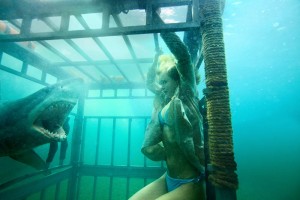Ellis’ film tours the banal and the absurd
Shark Night is about a group of college students who take a breather from classes at a picturesque lake, only to discover the lake is full of deadly sharks. It’s a simple (and fairly crass) premise, and there is ultimately a reason for the setting to be a lake rather than an ocean. That being said, it’s never justified, nor does it ever seem any more logical than it first appears.
This is the latest film from David R. Ellis, who helmed such notorious, critical pariahs as Snakes on a Plane and Final Destination 2. As with his other works, Ellis imbues this film with an aura of self-satirizing ridiculousness. He also brings his deficiency of visual storytelling.
To the film’s credit, however, it manages to escape the clutches of Ellis’ severe shortcomings by reaching an intellect — not necessarily a quality one — absent in the rest of his filmography.
The film is clearly trying to capitalize on the recent demand for high-gore, high-shock, low-intelligence monster movies. Thankfully, it doesn’t quite succeed, largely because of the wit present in some scenes of the film, but also because of the PG-13 rating and overall lack of excessive gore. Shark Night is a distant relative, rather than a sibling, of last year’s egregious Piranha 3D.
That said, there is certainly plenty to criticize in the film. The cast of obnoxiously good-looking, banally diverse college students is, on the whole, unlikeable and pedestrian. Dustin Milligan, the film’s lead, stands out as the worst in the film; he is totally uncharismatic and unforgivably inauthentic. The rest are mostly forgettable even if not markedly poor, with one notable exception: Chris Zylka, who plays the pretty-boy character, initially a stand-out as a detestable character, but then a redemptive figure with two or three moments revealing considerable talent.
The direction of the film, technically speaking, can only be described as deficient. Ellis relies on long takes that emphasize nothing but laziness, and he never even attempts to craft creative or interesting framing, making the movie very boring to watch. Adding injury to insult, the CGI that is so prominent in the film, depicting the sharks themselves, is appalling — many video games have better graphics.
What lean quality the film can claim originates with the screenplay. There were clearly multiple writers at work here because amid the incompetent dialogue and annoying plotting, there are several redeeming elements. The script smartly recognizes that human nature can be much more frightening than computer-generated sharks.
Genre stereotypes and clichés are fairly consistently subverted, which shall be admired even if it sinks too often into exploitation. The film manages to make something resembling a human connection with its audience, generating a small degree of pathos, where other horror films opt for more violence and gore.
More simply, there were a few small, seemingly insignificant story beats that resonated a great deal, clearly reflecting that someone who worked on this script knows how to tell a decent story. There is an instance in the third act, for example, when an element of pop culture is wisely brought into the mix in a way that will make audience members laugh, but also no doubt make them think.
At the end of the day, Shark Night will be forgotten. It alternates between the bland and the radiantly absurd, but never attains a sufficient paucity of quality to make it infamous. On the other hand, its few strengths are not nearly enough to turn any heads.
The movie seems the result of a struggle between the capitalistic-minded studio and director, and important but suppressed writers just trying to generate a good story — the result of which is worth considering, but probably not worth watching.

